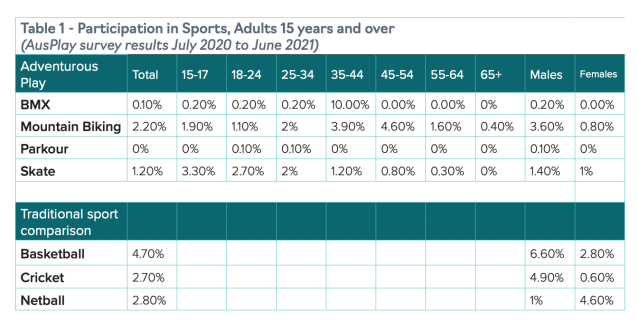Councils are being encouraged to do more to design and deliver spaces for ‘adventurous play’ such as skate parks, climbing walls, BMX bike tracks and parkour courses.
A report commissioned by NSW planning department unpacks the benefits, barriers, myths, and best practices relating to adventurous play.
Adventurous play, according to the report, refers to ‘unstructured and free outdoor physical play activities that push boundaries and involve an element of risk’.
This could include mountain biking, bicycle motocross, skateboarding, scootering, rollerblading, roller skating, climbing, and parkour.
Traditionally, local authorities have baulked because of fears of legal liability, the need for ongoing management and even community backlash.
However, the report says there’s an increasing demand for adventurous play spaces as urban and regional places continue to grow and densify.

It says there are many benefits that adventurous spaces bring including improved health and wellbeing, social cohesion and increased economic activity.
It also argues that having quality, well planned and managed adventurous spaces not only increases opportunities for participation by all members of the community, but also and reduces risks.
It’s hoped the insights contained in the report, which are based on a literature review, case studies and surveys with residents and councils, can support the provision of more high quality adventurous spaces throughout metropolitan, regional and rural NSW.
Adventurous spaces design guide
The report has informed the development of an Adventurous Spaces best practice design guide, being developed by the state government as a practical tool to support the creation of adventurous play spaces.
It offers a practical guide for people involved in the shaping of public spaces on how to plan, design, deliver and manage quality adventurous open spaces for communities, the government says.
“While diverse in nature, these activities share a common thread: they ignite a spark of joy, excitement, and adventure in participants,” the Department of Planning, Housing and Infrastructure says.
By implementing the principles and tools outlined in this guide, stakeholders can ensure that public spaces cater to the diverse needs and interests of their communities.”
Feedback on the draft guide is open until March 28.





Leave a Reply